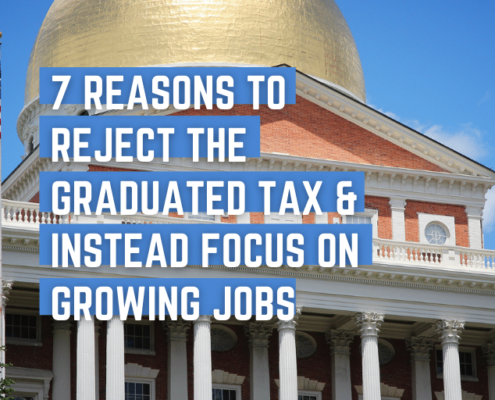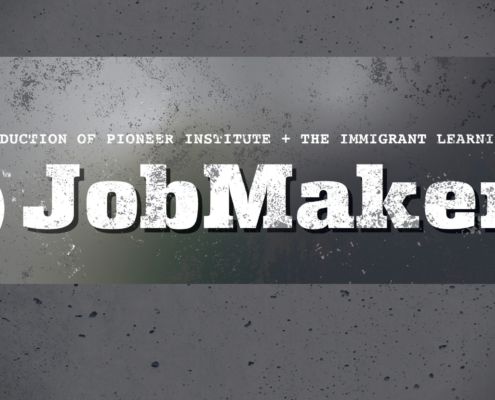
MBTAAnalysis: A look inside the MBTA
0 Comments
/
The MBTA shuttles over a million passengers a day around Greater…
 https://pioneerinstitute.org/wp-content/uploads/CloseupClock-1.jpg
739
1244
Mary Connaughton
https://pioneerinstitute.org/wp-content/uploads/logo_440x96.png
Mary Connaughton2017-02-20 12:34:192017-02-21 09:47:58The Clock is Ticking…….
https://pioneerinstitute.org/wp-content/uploads/CloseupClock-1.jpg
739
1244
Mary Connaughton
https://pioneerinstitute.org/wp-content/uploads/logo_440x96.png
Mary Connaughton2017-02-20 12:34:192017-02-21 09:47:58The Clock is Ticking…….
Open Letter: Extend the Term of the MBTA’s Fiscal and Management Control Board
Read Pioneer Institute's Open Letter urging policymakers to extend the term of the MBTA’s Fiscal and Management Control Board (FMCB), which is currently scheduled to sunset at the end of June. The Letter also calls for the Control Board to continue to be made up of transit experts rather than political appointees, and recommends that an independent audit office be created that reports directly to the FMCB.

Study Calls for Better Reporting on Impact of COVID-19 in Eldercare Facilities
Over time, the Massachusetts Executive Office of Health and Human Services and Department of Public Health (DPH) have improved reporting about cases and deaths from COVID-19 in state-regulated eldercare facilities, but flaws and omissions remain and should be corrected, according to a new study published by Pioneer Institute.

Study Says Interstate Tax Competition, Relocation Subsidies Exacerbate Telecommuting Trends
A spate of new incentive and subsidy programs seeking to lure talented workers and innovative businesses away from their home states could constitute an additional challenge to Massachusetts’ economic and fiscal recovery from COVID-19, according to a new study published by Pioneer Institute.

7 Reasons to Reject the Graduated Tax and Instead Focus on Growing Jobs
Pioneer Institute's Statement before the Joint Committee on Revenue In Opposition to: HB 86 (Pages 1-4), a legislative amendment to the Constitution to provide resources for education and transportation through an additional tax on incomes in excess of one million dollars.

Study Warns Massachusetts Tax Proposal Would Deter Investment, Stifling the “Innovation Economy”
A state constitutional amendment promoted by the Massachusetts Teachers Association and the Service Employees International Union adding a 4 percent surtax to all annual income above $1 million could devastate innovative startups dependent on Boston’s financial services industry for funding, ultimately hampering the region’s recovery from the COVID-19 economic recession, according to a new study published by Pioneer Institute.

Study Shows the Adverse Effects of Graduated Income Tax Proposal on Small Businesses
The state constitutional amendment promoted by the Massachusetts Teachers Association and the Service Employees International Union to add a 4 percent surtax to all annual income above $1 million will adversely impact a significant number of pass-through businesses, ultimately slowing the Commonwealth’s economic recovery from COVID-19, according to a new study published by Pioneer Institute.

Poll Finds Mixed Views About Schools’ Pandemic Performance
A year into the COVID-19 pandemic, Massachusetts residents have mixed opinions about how K-12 education has functioned, but they tend to view the performance of individual teachers more favorably than that of institutions like school districts and teachers’ unions, according to a poll of 1,500 residents commissioned by Pioneer Institute.

Study: Systemic Failure in IDEA Implementation for Private School Students with Disabilities in Additional States
On the heels of a $3.8 million settlement for private school students with disabilities in Massachusetts for the state’s failure to comply with provisions of the federal Individuals with Disabilities Education Act (IDEA) that require provision of equitable, publicly funded special education services to students in private schools, a Pioneer Institute study finds that two states and three school districts around the country for which data are available also appear to be out of compliance.

Study: Graduated Income Tax Proposal Fails to Protect Taxpayers from Bracket Creep
The state constitutional amendment proposed by the Service Employees International Union and the Massachusetts Teachers Association to add a 4 percent surtax to all annual income above $1 million purports to use cost-of-living-based bracket adjustments as a safeguard that will ensure only millionaires will pay. But historic income growth trends suggest that bracket creep will cause many non-millionaires to be subject to the surtax over time, according to a new study published by Pioneer Institute.

New Analysis: ICER Framework Ignores Patient Preferences, Innovation & Societal Benefits in Evaluating Cost-Effectiveness of New Cancer Treatments
Pioneer Institute today released a new analysis, The QALY and Cancer Treatments: An Ill-Advised Match, that examines the alarming methodological and contextual shortcomings of the Quality Adjusted Life Years (QALY)-based methodology in evaluating new cancer therapies. The Pioneer Institute analysis reveals five specific problems with ICER’s evaluation of cancer treatments and demonstrates the urgent need to prohibit the use of the QALY amid trends in rapid cancer innovations and personalized medicine.

Pioneer Institute, The Immigrant Learning Center Co-Produce New Weekly Podcast
Pioneer Institute is pleased to announce the launch of JobMakers, a new weekly podcast that explores the world of risk-taking immigrants who create new products, services, and jobs in New England and across the United States. JobMakers is produced in collaboration with The Immigrant Learning Center (ILC) of Malden, MA.

New Study Warns Graduated Income Tax Will Harm Many Massachusetts Retirees
If passed, a constitutional amendment to impose a graduated income tax would raid the retirement plans of Massachusetts residents by pushing their owners into higher tax brackets on the sales of homes and businesses, according to a new study published by Pioneer Institute. The study, entitled “The Graduated Income Tax Trap: A retirement tax on small business owners,” aims to help the public fully understand the impact of the proposed new tax.

Study: Graduated Income Tax Proponents Rely on Analyses That Exclude the Vast Majority Of “Millionaires” to Argue Their Case
Advocates for a state constitutional amendment that would apply a 4 percent surtax to households with annual earnings of more than $1 million rely heavily on the assumption that these proposed taxes will have little impact on the mobility of high earners. They cite analyses by Cornell University Associate Professor Cristobal Young, which exclude the vast majority of millionaires, according to a new study published by Pioneer Institute.

Report Contrasts State Government and Private Sector Employment Changes During Pandemic
Massachusetts state government employment has been virtually flat during COVID-19 even as employment in the state’s private sector workforce remains nearly 10 percent below pre-pandemic levels, according to a new study published by Pioneer Institute. The study, “Public vs. Private Employment in Massachusetts: A Tale of Two Pandemics,” questions whether it makes sense to shield public agencies from last year’s recession at the expense of taxpayers.

Study Finds Massachusetts Graduated Income Tax May Be a “Blank Check” and Not Increase Funding for Designated Priorities
Advocates claim a proposed 4 percent surtax on high earners will raise nearly $2 billion per year for education and transportation, but similar tax hikes in other states resulted in highly discretionary rather than targeted spending, according to a new policy brief published by Pioneer Institute. That same result or worse is possible in Massachusetts because during the 2019 constitutional convention state legislators rejected — not just one, but two — proposed amendments requiring that the new revenues be directed to these purposes.

Report: Proposed Graduated Income Tax Might Not Increase State Education and Transportation Spending
While supporters of a state constitutional amendment that would impose a 4 percent tax rate hike on annual income over $1 million claim additional revenue from the surtax will fund public education and transportation needs, the amendment in no way assures that there will be new spending on these priorities. In fact, without violating the amendment, total state education and transportation funding could stay the same or even fall, according to a new review published by Pioneer Institute.

Key Madison Park Program Lags Other State Voc-Techs, but Shows Signs of Improvement
The co-operative education program at Boston’s Madison Park Technical Vocational High School, which places students in paid positions with local employers, lags far behind other Massachusetts vocational-technical schools in terms of both placements and number of employer contacts. But with the school as a whole beginning to improve after years of turmoil, the co-op is also showing promising signs, according to a new study published by Pioneer Institute.

New Study Highlights Economic Fallout from California’s 2012 Tax Hike
A 2012 income and sales tax increase in California, named “Proposition 30,” stifled business activity, accelerated out-migration among the wealthy, and ultimately reduced the state’s tax base, according to a new study published by Pioneer Institute that aims to share empirical data about the impact of tax policy decisions.

New Study Finds Pandemic-Spurred Technologies Lowered Barriers to Exit in High-Cost States
Both employers and households will find it easier to leave major job centers as technologies made commonplace by the COVID-19 pandemic have led to a rethinking of the geography of work, according to a new study published by Pioneer Institute.

New Study Shows Significant Wealth Migration from Massachusetts to Florida, New Hampshire
Over the last 25 years, Massachusetts has consistently lost taxable income, especially to Florida and New Hampshire, via out-migration of the wealthy, according to a new Pioneer Institute study.
In “Do The Wealthy Migrate Away From High-Tax States? A Comparison of Adjusted Gross Income Changes in Massachusetts and Florida,” Pioneer Institute Research Director Greg Sullivan and Research Assistant Andrew Mikula draw on IRS data showing aggregate migration flows by amount of adjusted gross income (AGI). The data show a persistent trend of wealth leaving high-tax states for low-tax ones, especially in the Sun Belt.

New Book Offers Roadmap to Sustainability for Massachusetts Catholic Schools
Catholic schools in Massachusetts must focus on the characteristics that make them academically successful and distinguish them from traditional public schools, but must also seek new models and governance structures that will help them achieve financial sustainability, according to a new book published by Pioneer Institute. The book, "A Vision of Hope: Catholic Schooling in Massachusetts," will be the topic of a webinar co-sponsored by Pioneer and the Catholic Schools Foundation to be held on Wednesday, January 27 at 2:00 pm.
Study: Massachusetts Should Embrace Direct Healthcare Options
Especially in the COVID era, many are looking to alleviate the increased burden on the healthcare system. One solution is direct healthcare (DHC), which can provide more patient-centered care at affordable prices and is an effective model to increase access to care for the uninsured, underinsured and those on public programs like Medicaid, according to a new study published by Pioneer Institute.

California Tax Experiment: Policy Makers Receive Valuable Economics Lesson
Host Joe Selvaggi talks with Stanford University Economics Professor Joshua Rauh about his research on the reaction of Californians to a tax increase, from his report, “The Behavioral Response to State Income Taxation of High Earners, Evidence from California.” Prof. Rauh shares how his research offers tax policy makers insight into the likely effects of similar increases in their own states, including here in Massachusetts.

New Study Finds Tax Policy Drives Connecticut’s Ongoing Fiscal & Economic Crisis
Multiple rounds of tax increases aimed at high earners and corporations triggered an exodus from Connecticut of large employers and wealthy individuals, according to a new study published by Pioneer Institute.

New Study Provides Toolkit for Crafting Education Tax-Credit Scholarship Programs
In the wake of a U.S. Supreme Court ruling that struck down a key impediment to private school choice, Pioneer Institute has published a toolkit for designing tax-credit scholarship programs. Now available in 18 states, nearly 300,000 students nationwide use tax-credit scholarships to attend the school of their family’s choice. TCS policies create an incentive for taxpayers to contribute to nonprofit scholarship organizations that aid families with tuition and, in some states, other K–12 educational expenses. This paper explores the central design features of TCS policies—such as eligibility, the tax credit value, credit caps, and academic accountability provisions—and outlines the different approaches taken by the TCS policies in each state.

Pioneer Report Spotlights Decade-long Building Boom in Massachusetts Construction Industry
In the lead-up to the COVID-19 crisis, the Massachusetts construction industry enjoyed a boom in select subsectors, though employment numbers had yet to recover from the setbacks of the Great Recession, according to a new report from Pioneer Institute that draws data from the MassEconomix web tool.

Pioneer Institute Statement on MBTA Service Cuts
Even as MBTA ridership and revenue have been gutted by the COVID-19 pandemic, the system remains a lifeline for so many residents in the Greater Boston area, especially those working in essential services like health care or in industries most impacted by the pandemic such as the restaurant sector. Facing a crisis of this magnitude, T leadership must first do its all to rethink how it delivers services before reflexively making cuts.

Pioneer Checklist Includes Steps for Policy Makers, Business Owners to Revitalize Hardest-Hit Industries
Combining the recommendations of studies published earlier this year, Pioneer Institute has released “A Checklist for How to Revitalize the Industries Hit Hardest by COVID-19.” The recommendations for policy makers are organized in three sections: Immediate Relief, Tax Policy Changes and Permanent Reforms. Business owner recommendations are split into COVID-19 Health and Safety Protocols, Expanded Services and Steps to Improve Cash Flow.

Pioneer Report Highlights Pre-Pandemic Employment Growth in Massachusetts’ Hospitality & Food Industry
In the lead-up to the COVID-19 crisis, the Massachusetts Hospitality and Food Industry enjoyed generally positive employment growth, according to a new report from Pioneer Institute that draws data from the MassEconomix web tool. Most of the Hospitality and Food Industry employment across the state is concentrated in full-service restaurants and hotels.

Pioneer Institute Announces New Chair of the Board
Pioneer Institute, the leading think tank in Massachusetts with focus areas in education, health, transportation and economic opportunity, today announced the appointment of Adam Portnoy as Chair of its Board of Directors. Portnoy joined the Pioneer Board in 2018 and succeeds Stephen D. Fantone, who served as Chair from 2012. This change occurs as the Institute releases its Pioneer2024 strategic plan, which marks a new stage in Pioneer’s development and outlines initiatives to expand its public interest law activities, dramatically amplify its direct communication audience, and strengthen its policy impact.
